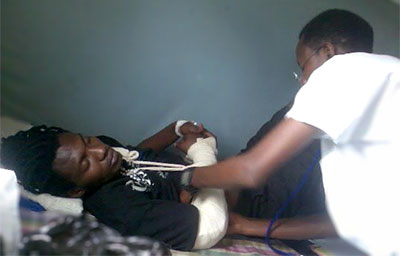Burundi’s government took unusually swift action last week in response to the police shooting of a radio reporter, after the journalist sought information at a roadblock in the capital Bujumbura where market vendors were allegedly being “taxed” for passage. Perhaps the shooting could have been averted if authorities had bothered to discipline officers involved in previous attacks on journalists.
“It’s because of God that I am alive,” Patrick Paggio Niyonkuru, cultural reporter for leading Burundian independent broadcaster Radio Publique Africaine, told me via telephone this week from a hospital in Bujumbura, where he is still recovering from a bullet wound to his right arm.
The shooting occurred around 4 a.m. local time on March 27, according to news reports and CPJ interviews with local journalists. Niyonkuru said he was not on duty and was giving a lift to a co-worker when he noticed a commotion between about eight police officers and fruit and vegetables vendors who use bicycle taxis to ferry their goods to the local markets. Following his journalist’s instinct, Niyonkuru approached to inquire. The police officers had apparently confiscated the vendors’ goods and bicycles, conditioning their release on the payment of 200 Burundian francs (less than US$1 dollar) each in “taxes.”
As Niyonkuru began questioning the vendors, a police officer spotted him. “It’s at that moment that an officer arrived. He asked me why I was there,” the journalist told me. It was not long before other officers identified Niyonkuru as a journalist. One officer raised his gun and ordered Niyonkuru to put his hands in the air. He complied with the order, but the officer, apparently unnerved, fired on the journalist without warning. Niyonkuru said he remembered hearing three gunshots and feeling sharp pain on his right arm before collapsing. The officer who shot him then used his gun to hit him while he was on the ground. “You journalists, why do you meddle in police business?” Niyonkuru said he heard the officer saying, before he was restrained by his colleagues. Niyonkuru was rushed to the hospital, where he gave a video interview recounting his ordeal (in the local Kirundi language).
The government’s reaction to the shooting was unusually swift. The Disciplinary Council of the Burundi National Police convened an emergency meeting to ban the officer, identified as Pierre Havyarimana, from the ranks. Havyarimana was arrested, brought before a court in a summary trial covered by the press, and sentenced to 15 years in prison, Bob Rugurika, editor-in-chief of RPA, told CPJ. A spokesman of the Burundi National Police was quoted in press reports as saying that “the behavior of the officer has shocked the entire corps.”
Denise Mugugu, the President of Burundi’s Press House, an independent press center, told CPJ that the rapid government reaction to the shooting was a surprise considering lack of action by authorities in previous anti-press violence. For example, no police officers have been disciplined for the brutal dispersal of a peaceful march of journalists in February. Police have yet to make an arrest in a suspicious attack, two days before Niyonkuru’s shooting, on the home of another journalist, Willy Abagenzinikindi, of private Radio-Télé Renaissance. The assailants attacked Abagenzinikindi with machetes, according to local news reports and local journalists. They also seized tapes with Abagenzinikindi’s video footage from the central province of Mwaro about the public reaction to a restrictive press bill, according to the same sources.
“We have given the case a lot of press coverage. It can deter other officers from attacking journalists. Here, a journalist is not anybody, and they know it,” Mugugu said.
However, the shooting diverted attention from the serious allegations of police extortion that Niyonkuru was investigating, according to Mugugu. “There were people that reported such things, but many victims don’t report it for fear of being persecuted,” she said.
In fact, a 2011 study released by Transparency International’s East Africa chapters found the top reasons East Africans gave for not reporting corruption was a lack of faith that any action would be taken and fear.
“Police use guns, we use our mouths. We don’t have weapons, our force is in airwaves, writings, it’s to say that we cannot stand injustice and corruption,” Niyonkuru told me.
EDITOR’S NOTE: This post has been updated to reflect the correct spelling of Bob Rugurika’s name.
